A VN Case Study of Heidi Pryce
“As with anything in life, the more you put into it, the more you get out of it!”
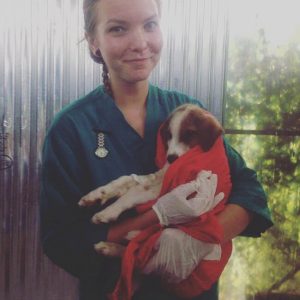
Since undertaking the Level 3 Diploma in Veterinary Nursing at The College of Animal Welfare and qualifying as a veterinary nurse in September 2015, Heidi Pryce has taken her skills abroad, working as an International Veterinary Nurse on welfare projects across the globe. Here, Heidi looks back on her veterinary nurse training and the colourful career history she has enjoyed since leaving college…
Why did you choose to study veterinary nursing?
I had wanted to be a veterinary nurse all my life, however various teachers at school and college told me ‘I wasn’t clever enough’. After an unfulfilling attempt at a creative career, I realised I wanted a job that allowed me to work with animals, keep my brain engaged, take me around the world and allow me to give something back and make a difference. So with some encouragement from my mum (thanks mum!) I went back to study full time at 27. It was time to make myself ‘clever enough’.”
Why did you choose to study at The College of Animal Welfare?
After being in a creative environment for years, I really wanted to submerge completely into my new career, and being around people who cared as much about animals as I did, really appealed.
I chose the Huntingdon Campus because the facilities really appealed to me, in particular, all the books in the library. The tutors at CAW helped consistently, they were always encouraging and helpful and brought good humour to the table when the going got tough! Our lectures were never just an old school ‘listen to your teacher talk’. We would have open discussions, kinetic learning like making cells with jelly – so I was kept engaged and I think this appealed to most nurses learning styles.
What did you like best about your course and how did it prepare you for your career?
I really enjoyed being at college just 1-2 days a week and working in practice the rest of the time. It is a practical job, so it would be difficult to learn any other way. I would cram my brain on college days and put it into practice and conversation during work.
I was very lucky to work with exotics in my first year, and in a large first opinion clinic in my second year. There was around 25 nurses and 12 vets, so I learnt a lot of different techniques. As my tutor told me ‘there isn’t one way to make a cup of tea’! This definitely helped for all the different settings I would work in in the future.
What did you do after you left college?
I had set up a volunteer position in Sri Lanka for the week my OSCE results came out! The project already knew how well UK nurses are trained and said I would be welcome if I had passed or not. I was lucky I passed my OSCEs first time.
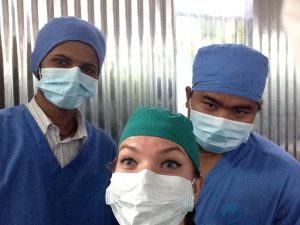 I volunteered on a neutering clinic for 10 days, driving out to villages around Negombo and sterilising dogs and cats out the back of a truck. It really pushed the golden standard boundaries my college and clinic had taught me, but it was great fun to think out of the box and get a taster of working with street dogs and in animal welfare.
I volunteered on a neutering clinic for 10 days, driving out to villages around Negombo and sterilising dogs and cats out the back of a truck. It really pushed the golden standard boundaries my college and clinic had taught me, but it was great fun to think out of the box and get a taster of working with street dogs and in animal welfare.
I ended the trip advising the team on gas anaesthesia and manuka honey bandages – which they now have in place. It was a great confidence boost for me to be able to help when I had only just qualified.
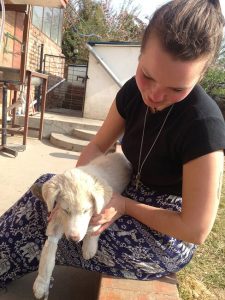
In February 2016, before moving to work in Australia, I volunteered at KAT centre in Nepal for a month, helping give treatments and sterilising the street dogs and cats of Kathmandu. I experienced a lot of distemper, parvo, TVT and RTAs here, something I wouldn’t have experienced in the UK.
When I got to Australia I worked in a GP, but a couple of months in and I was missing animal welfare. I got proactive and sent emails out. I couldn’t believe my luck when I got offers from India, Cambodia, Sri Lanka and Nepal.
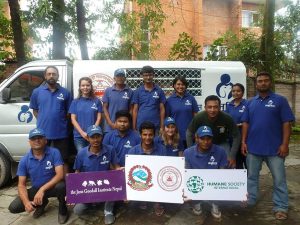 I accepted an offer back in Kathmandu, this time setting up a street dog sterilisation and rabies clinic (otherwise known as Trap Neuter Vaccinate Release (TNVR)). This was a particularly exciting project because this was the first project of this kind that the Government would be supporting. I worked in Kathmandu for 11 months, training a team of 10 locals how to nurse, working with the head vet to locate and set up the clinic, and supporting our two new grad vets. We all worked together to write the protocols for the clinic and worked out ways to ensure the dogs’ welfare was maintained daily. We did surveys every 6 months and received positive feedback instantly. The dogs’ health was improving; children knew what to do around dogs and in the case of a bite (thanks to the education team). We did a rally and a mural for world rabies day, creating awareness and a real positive change.
I accepted an offer back in Kathmandu, this time setting up a street dog sterilisation and rabies clinic (otherwise known as Trap Neuter Vaccinate Release (TNVR)). This was a particularly exciting project because this was the first project of this kind that the Government would be supporting. I worked in Kathmandu for 11 months, training a team of 10 locals how to nurse, working with the head vet to locate and set up the clinic, and supporting our two new grad vets. We all worked together to write the protocols for the clinic and worked out ways to ensure the dogs’ welfare was maintained daily. We did surveys every 6 months and received positive feedback instantly. The dogs’ health was improving; children knew what to do around dogs and in the case of a bite (thanks to the education team). We did a rally and a mural for world rabies day, creating awareness and a real positive change.
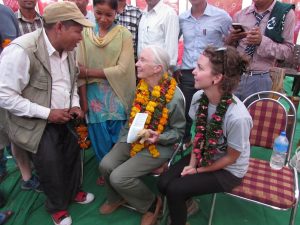
The project ran alongside the Jane Goodall Institute, I was asked to help with a couple of their projects. The first was an excursion to raise awareness for the endangered Ganges River Dolphins. We had people come from all over the world to Kathmandu and flew over the Himalayas to Bardia, home of the Karnali river, and walked through jungle meeting wild elephants, rhinos and tigers. Of course, all with Jane Goodall in tow!
The second project was to host an international conference, Asia for Animals (AFA). Around 500 people came from all around the world for 3 days to talk, listen and engage with the theme ‘Human Behaviour Change’ and how it can be applied to conservation and welfare.
After Kathmandu I went back to Australia and volunteered with Sea turtles in Far North Queensland. We had two turtles in the clinic initially, both in for plastic ingestion. When the turtles ingest plastic they cannot maintain depth in the water and float – making them vulnerable to be hit by boats or attacked by other more natural predators.
One (endangered) flat back turtle was around 90 years old, she only had half of a front flipper and part of the back of her shell was missing, but now healed, from a previous shark attack. She came in from ingesting plastic and having the top of her shell scraped by a boat.
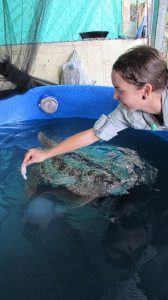 A third turtle came in during my time there, she was found in a creek and couldn’t float. She just passed buckets and buckets of plastic and rubble until she could move freely again, she was lucky to be released within a month, but most turtles take a lot longer than that.
A third turtle came in during my time there, she was found in a creek and couldn’t float. She just passed buckets and buckets of plastic and rubble until she could move freely again, she was lucky to be released within a month, but most turtles take a lot longer than that.
We did beach cleans, & checked on nests on the beach regularly, sadly a lot of places where the turtles went to hatch would be a favourite spot for quad bikers, so we took our time to talk to people around and make them aware.
I then went back into locuming around Australia – one was a holistic vets. It was interesting to learn alternative therapies for pets, including acupuncture, homeopathy, aromatherapy and traditional Chinese medicine. I also worked in a few ‘normal’ GPs which was good for me to put into practice all the procedures learnt in college and UK practice, as I was worried I would loose my touch.
When my 2 year visa ended in Australia I went on to manage a clinic in Cambodia. It was a western style private clinic but brought in a lot of cat & dog welfare groups, the apopo land mine rats, cows and a local wildlife group came in also. I organised a free neutering camp when I was there and a local group from Hong Kong came over to use our facilities and neutered 72 dogs over the three days.
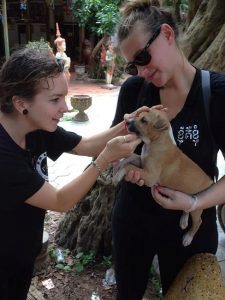 Cambodia was perhaps one of the harder countries to work in. One rabies case was a particular eye opener, a young 8 year old boy got bitten by his pet dog, after he had been acting strangely. He and his sister were so upset when we explained that we had to put his dog to sleep, but when we explained the boy would need post exposure vaccines, they didn’t understand the severity of it. To them it’s just another episode of ‘crazy dog disease’, they didn’t know they could get, or would need post exposure vaccines. When we explained the sister couldn’t afford them. I couldn’t have the boy walk out the clinic knowing that his bite was sufficient enough to contract the virus so offered to pay for his hospital bill. In return, the boy took me around his neighbourhood and showed me all the dogs. We made leaflets in three different languages and gave rabies vaccines to all the neighbourhood dogs. I was amazed at how the boy still loved all the dogs and how much they loved him, thankfully the situation didn’t affect him at all.
Cambodia was perhaps one of the harder countries to work in. One rabies case was a particular eye opener, a young 8 year old boy got bitten by his pet dog, after he had been acting strangely. He and his sister were so upset when we explained that we had to put his dog to sleep, but when we explained the boy would need post exposure vaccines, they didn’t understand the severity of it. To them it’s just another episode of ‘crazy dog disease’, they didn’t know they could get, or would need post exposure vaccines. When we explained the sister couldn’t afford them. I couldn’t have the boy walk out the clinic knowing that his bite was sufficient enough to contract the virus so offered to pay for his hospital bill. In return, the boy took me around his neighbourhood and showed me all the dogs. We made leaflets in three different languages and gave rabies vaccines to all the neighbourhood dogs. I was amazed at how the boy still loved all the dogs and how much they loved him, thankfully the situation didn’t affect him at all.
Three years on from qualifying and I am now in India, to give something back to myself – yoga teacher training. Of course, I have started volunteering and I’m helping out a local NGO to put into place a sterilisation clinic here in Rishikesh! We go around and give treatments to street dogs daily as well as provide preventatives and rabies vaccines. I’m hoping to get some of the lovely vets and nurses I know out here to help.
What do you think has been your biggest achievement in your career so far?
Wow that’s a hard question to answer, mainly because I haven’t ever looked back on my achievements. If I had to choose I would say helping to set up the clinic in Kathmandu. Less than a year out of college I was able to help give these people all these tools to achieve so much; I’m very proud of them and how far the project has come. Seeing wild rhinos, elephants and tigers in the wild is up there too!
Can you tell us what your plans are for the future?
I’m currently in India for a holiday, but of course have started volunteering for the street dog projects here, I cannot stop myself. I will be going home for the first time this Christmas, the first time in 3 years. I cannot wait to see my friends and family, although I’m not looking forward to winter. I have a lot up my sleeve for 2019 but nothing set in stone yet. I’m hoping it will involve a lot more welfare work, rabies eradication and hopefully some conservation work. And of course, the glue that holds it all together – communication and education with people all around the world!
What advice do you have for someone looking to do this course/career?
I always think that the two best qualities a nurse should have is communication and honesty, it isn’t about being book smart, it is about character.
I guess you could say my work and volunteering has been built on contacts, it’s so important to communicate and remain professional in every aspect of nursing.
The course itself is intense with all the different tasks needed to complete in such a small amount of time, but your passion and curiosity will get you through – never be afraid to ask questions; and always question why when you’ve had the question answered.
There are so many areas of vet nursing to explore: medical nursing, surgical nursing, referral, oncology, emergency, orthopaedic, mentoring, teaching, writing, educating, small animal, large animal, exotics, conservation, welfare, UK – abroad! Do not be put off completely if you don’t like one area, move onto the next and keep trying different roles until you find what you enjoy. You will never know everything but you must always have the passion to learn. Every day is a school day.
As with anything in life the more you put into it, the more you get out of it.
